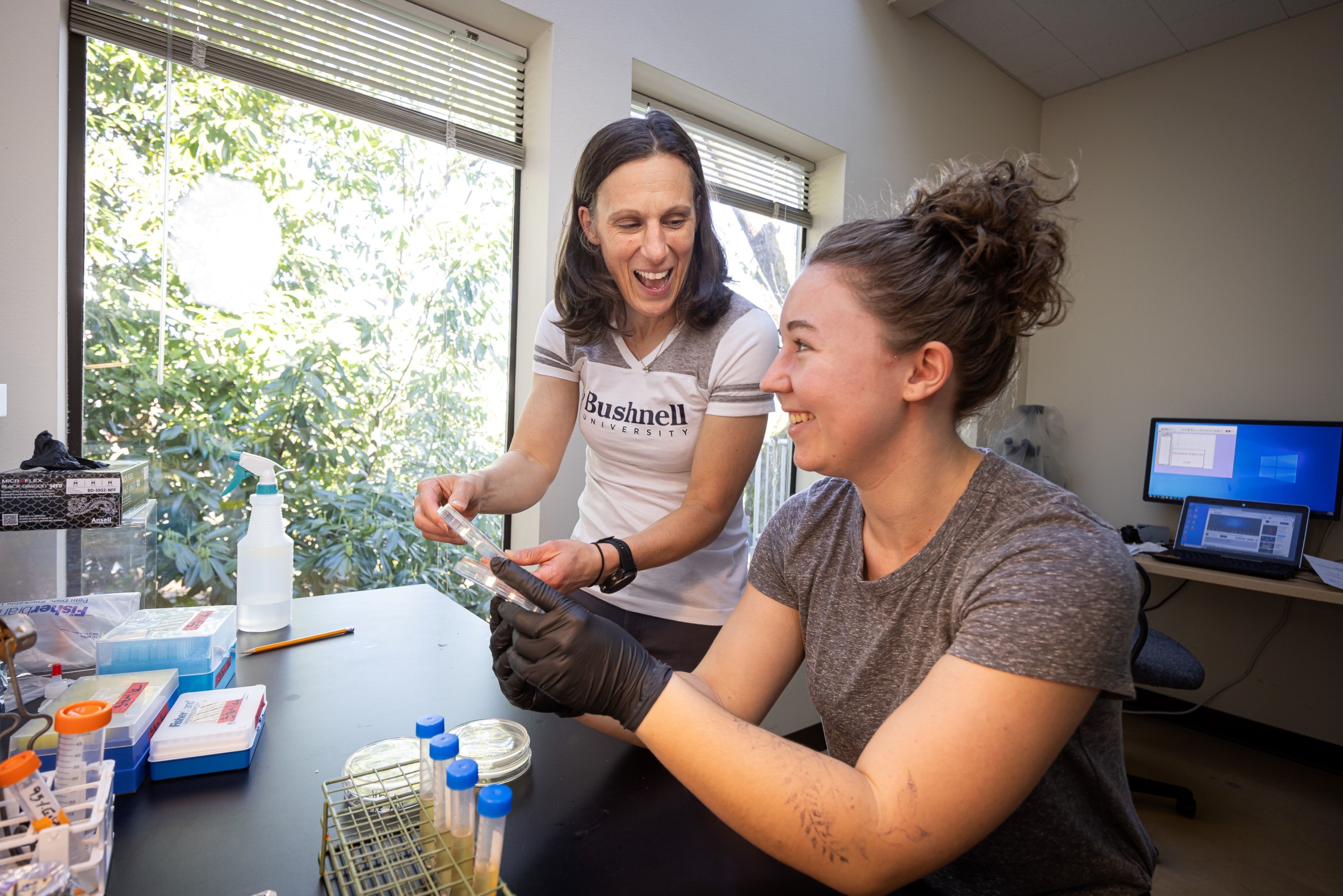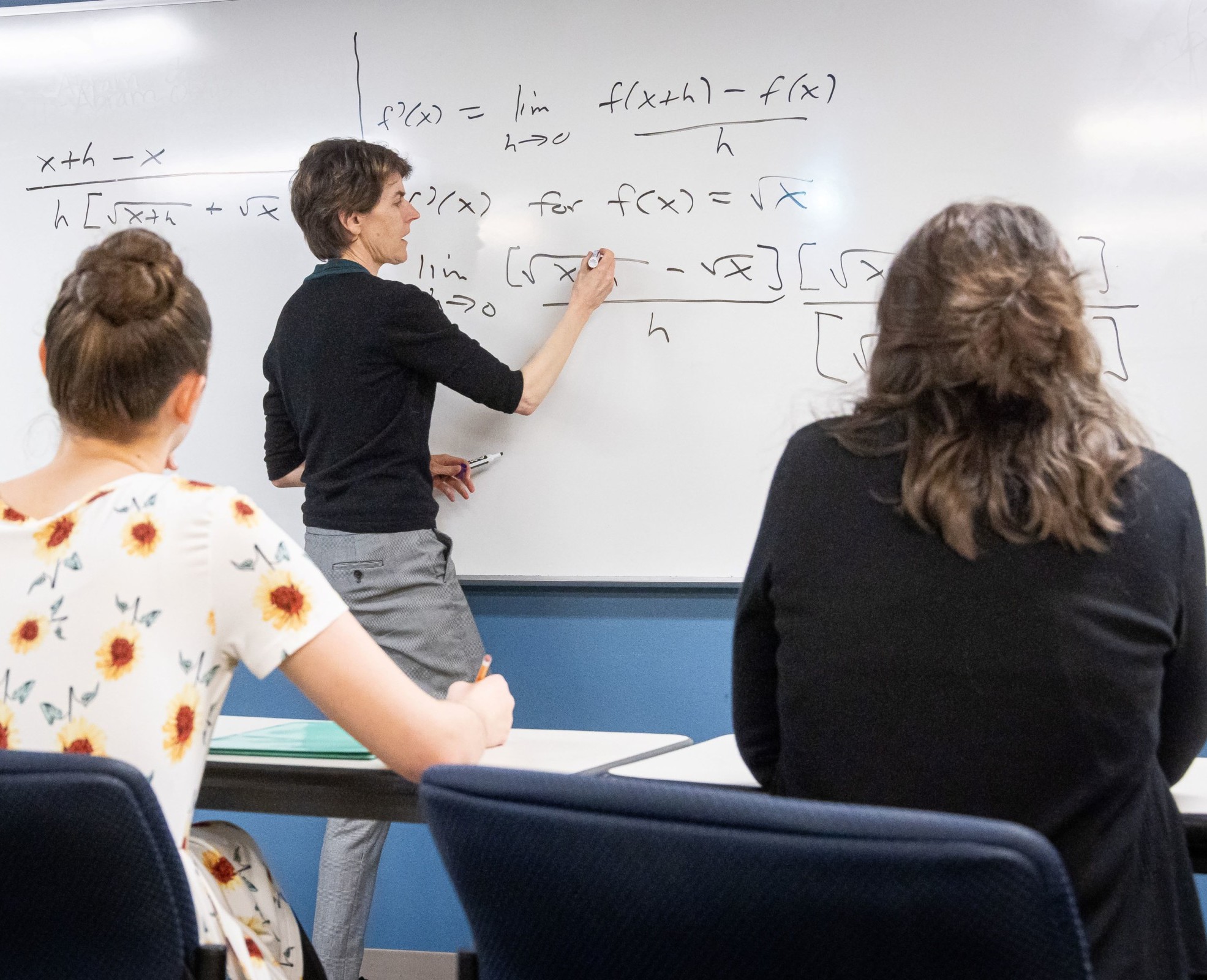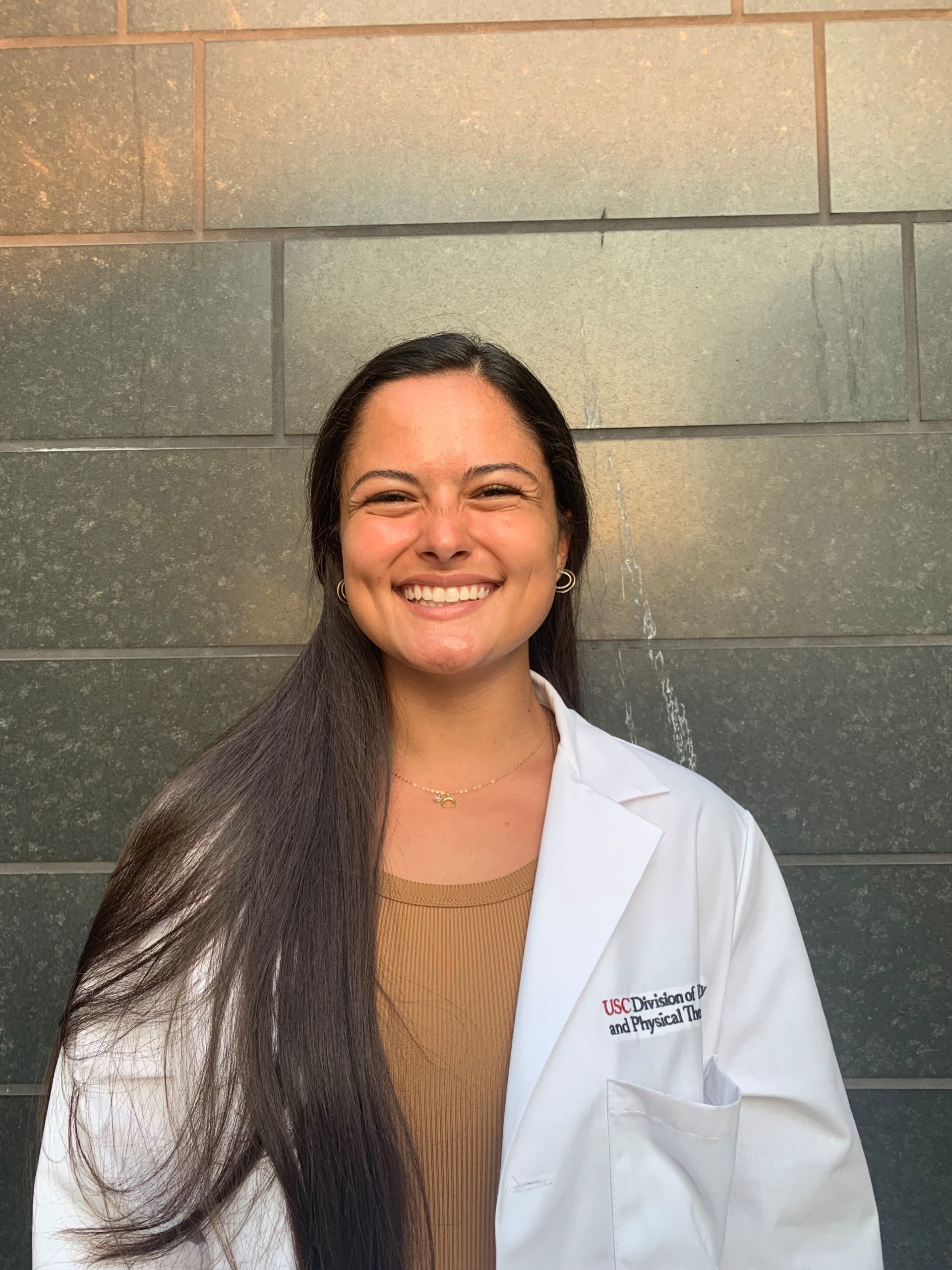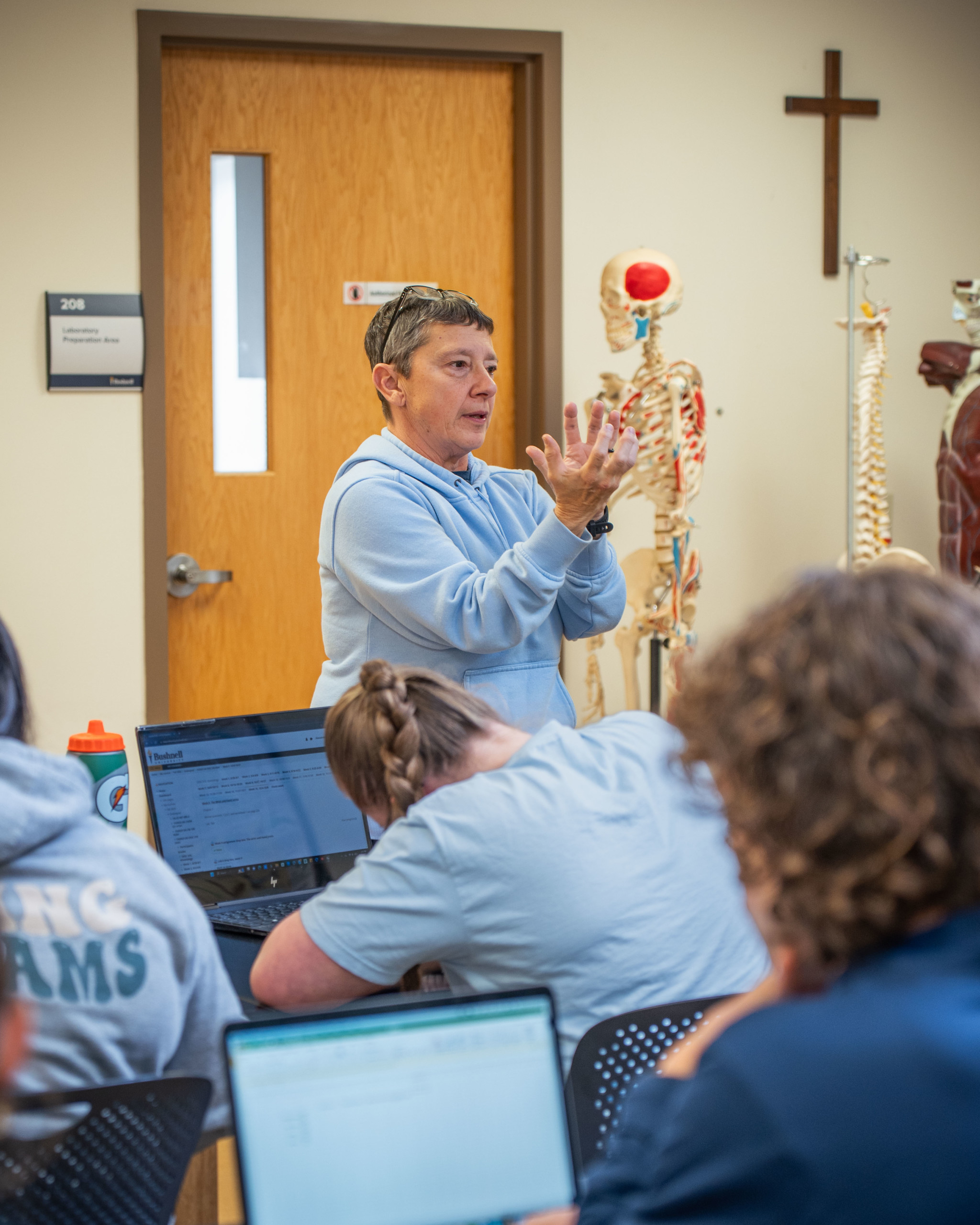Written by Meredith Goehring, M.A., Editorial Assistant
It’s a common story in higher education that women are underrepresented in the fields of science, technology, engineering, and math (commonly referred to as STEM).
The story is true. In 2023, women made up 28% of the STEM workforce worldwide, and just 24% of the STEM workforce in the United States. That’s up significantly from 8% in 1970, yet the gap remains.
Common explanations for this include a lack of female role models in STEM fields, particularly female STEM faculty at a university level, lack of knowledge for female students about what their career options are, and a lack of encouragement or confidence to pursue a STEM field. This is the story, and, in most places, an accurate one.
Women at Bushnell just have a different story.
“I’ve always liked science best,” says junior biology major Annika Poet. “I like having an answer, I like having things that make sense and have specific things to learn. I would probably be in the sciences no matter what.” Poet enjoyed science in high school, and she felt affirmed by her teachers and family to pursue science at the college level. She wants to be a veterinarian, and her gender never factored in this decision.
“I don’t think that female students today see a barrier between themselves and a STEM field or career, regardless of gender,” says Tammy Bovee, M.S., assistant professor of exercise science. Bovee herself never felt any discouragement or discrimination as a woman in STEM. This input is evidence of a changing mindset among recent generations. As students like Poet progress, they will migrate into STEM fields and continue to close the gap.
Bushnell is proud to draw so many women interested in pursuing careers in the sciences, as well as the professors who show them the way. Bushnell is also committed to practicing the kinds of methods that have been shown to rewrite the prevailing narrative.
The Role Model Factor

Studies have shown that for female STEM students, having a female role model has a positive and significant effect on a female student’s enjoyment of the subject, her expectation of success in the subject, and her further aspirations in STEM.
In 2023, only 28% of STEM professors and associate professors in the United States are women (despite women receiving 40% of STEM Ph.D.’s in the last decade). At Bushnell, however, over 50% of STEM faculty are female. This means that female STEM students get to see other women teaching and practicing successful STEM careers, from math to psychology.
Exercise science graduate Emily Moon ’19 cites chemistry professor Heike McNeil, Ph.D. as a significant role model during her time at Bushnell. “Heike was a huge encourager to me to learn and pursue so much more,” Moon recalls. “She had gotten her doctorate and had such high expectations of us. I was going to put in all the effort I could so I could be like her.” This confidence bolstered Moon as she pursued (and recently graduated from) a Doctor of Physical Therapy program at University of Southern California (USC), one of the top DPT schools in the country.
The Mentorship Factor

One common culprit hindering the pipeline of female students pursuing STEM careers is a lack of awareness about the available options. Popular career paths such as engineering, accounting, or medicine may seem most obvious, but what about food science, 3D printing engineering, or zoology? If no one ever tells students about these unique options, they may never have the opportunity to explore all that STEM has to offer.
Bushnell’s female students and alumni eagerly cite the mentorship they received as one of the most transformative features of their education.
Alumna Brooke Davis ’12 (math/accounting) points to mathematics professor Connie Wilmarth, Ph.D., as a guiding light for her STEM journey at Bushnell. “I started out unsure of what I wanted to do, yet I knew I was a numbers person,” Davis reflects. “But Dr. Wilmarth was wonderful. She helped me understand what options were out there in math and helped me see how big the world was.”
Davis has gone on to build a successful career in public accounting with a focus on agriculture. She says that the mentorship she received from professors such as Wilmarth significantly influenced her career trajectory.
For her part, Wilmarth loves this aspect of what it means to be a professor. “Bushnell encourages meaningful mentorship and interpersonal interactions between students and faculty,” she explains. “That plays out especially well for students who are not sure of their direction when they arrive. No one is ever feeling lost or overlooked here.”
The Confidence Factor
The final ingredient in student success – no matter their identity or major – is having the confidence to pursue their goals.
“I’ve had a great experience so far at Bushnell,” Poet shares. “I can tell my professors are very invested in their different areas. That helps me feel encouraged that if they can understand and get excited about this then I can understand it too.”

Moon felt similarly, and has seen the fruit of this encouragement. “I loved my experience with Dr. McNeil. She never settled for less than my best, and she was always pushing us all to excel. This really helped me when I got into graduate school.”
Providing students with this kind of encouragement is a major focus among Bushnell faculty. “For my female students, I want them to have the confidence to compete with any other student that’s out there,” says Bovee. “I think that sometimes men are encouraged more than women, so I want my female students to know that they are just as capable to move beyond their bachelor’s degree into graduate programs and eventually the workforce.”
McNeil, who primarily teaches chemistry, requires that her students do presentations in many of her courses. She admits that it mortifies them at first but helps to build their confidence. “I’m developing their confidence in what they’re doing and their ability to be the expert,” says McNeil. “They think I’m asking them questions just to ask, but I make it clear that I’m curious and I don’t always know the answers. Once they understand that, the more their confidence grows. I remind them that they know the material, and this is typically the best defense against intimidation.”
“It’s not just about STEM”

– Tammy Bovee, M.S. (above)
None of these strategies are unique, nor even particularly revolutionary. The literature surrounding the topic of women in STEM has routinely declared that to get more women into STEM fields you must provide them with role models and show them what career options are available to them.
However, what makes Bushnell remarkable is that our success in shepherding female students is a natural
by-product of our unique educational model. We provide our students with a holistic education that inspires their whole being.
Bushnell faculty are not focused on “getting women into STEM.” Rather, they are intent on awakening every student to God’s call for their lives. Paradoxically, the marvelous result is that many female students at Bushnell do choose to pursue and stick with science, technology, engineering, or math. They are empowered by our faculty and affirmed in their faith.
“Part of my role is to make sure that anyone who passes through my classroom knows that they can do it,” Wilmarth explains. “I’m so invested in Christian higher education as a holistic and appropriate way to view one’s education; faith is inseparable from learning.”
We continue to create a thriving culture for female students. One in which they are free to grow unfettered as fiercely intelligent, capable, and resilient children of God, willing and able to follow God’s call towards whatever field quickens their heart.
“Bushnell is amazing to me because it’s not just about STEM or any other subject,” Wilmarth celebrates. “It’s a much grander and more beautiful approach to all of life. The students who graduate in STEM are not just STEM people, but they are informed and wise and wish to serve and heal through Jesus Christ.”